Interview
It seems most improbable in this day and age that the daughter of two of the most charismatic stars of their generation—and the star herself in one of the highest grossing R-rated films of all time—should be a mystery to us. But such is the elusive figure cut by Dakota Johnson that she manages to somehow remain unshredded and undissected by the tabloids and social media.
It's not as if Dakota's parents, Don Johnson and Melanie Griffith, are such white-hot supernovas that she gets lost in the glare of their fame, but nor has she been raised in anonymity: Dakota was Miss Golden Globe in 2006 (one hell of a debutante party for the then 16-year-old), and two of her closest friends are descended from rock-star royalty. Her casting as Anastasia Steele, too, in 2015'sFifty Shades of Grey—after perhaps the most celebrated and scrutinized casting call in the past ten years—should have made her an overnight celebrity, or at least the regular fodder for gossip columns. But, not so much.
What we do know for sure is the work, including her terrific turn as a Boston gangster moll to Johnny Depp's Whitey Bulger in last year's Black Mass. In Luca Guadagnino's sun-soaked A Bigger Splash, out this month, Johnson plays a Lolita-ish foil to an ailing rock-star goddess played by actual goddess Tilda Swinton. It's a sensational performance in a sensational movie about allure and attraction among a group of lost souls. It probably doesn't bring us any closer to figuring out Johnson herself—but it may have helped her to do so. As the actress tells real-life rock star Chrissie Hynde, playing a character in dire existential distress helped her sort out a little of her own. But just a little.
CHRISSIE HYNDE: How are ya?
DAKOTA JOHNSON: I'm good! I'm in the middle of a day of work in Vancouver.
HYNDE: Oh, I love Vancouver. What are you working on?
JOHNSON: I'm filming the next two installments of the Fifty Shades movies back-to-back.
HYNDE: The one where you have crazy sex scenes?
JOHNSON: Yeah. I'm doing one today. [laughs] It's not ... comfortable. It's pretty tedious.
HYNDE: I had to kiss someone for a video once, and I was totally freaked for days, weeks—it was like getting a shot. He was a good-looking guy, too. Gary Stretch, the prize fighter. He's an actor in Hollywood now, but it didn't matter, you know? It was excruciating. So you've got to pretend to have sex with someone? Or, I don't know, maybe you're actually doing it. But in front of a whole camera crew...
JOHNSON: Well, we're not having actual sex. But I've been simulating sex for seven hours straight right now, and I'm over it.
HYNDE: What does your dad think of that? Does he watch it?
JOHNSON: [laughs] No! God, no. Thank God.
HYNDE: But he knows it's happening, obviously. He must know the drill by now. How is your good-looking dad, by the way?
JOHNSON: He's good.
HYNDE: And your mom?
JOHNSON: She's good. She's in L.A. My little sister just came to visit me for the weekend, which was cute. What have you been up to?
HYNDE: I'm in West London. I've got an album coming out with Dan Auerbach ...
JOHNSON: Oh, I know Dan.
HYNDE: That won't come out till the fall because I'm in a queue to get it mixed—which is good because I can goof off all summer, so I'm pretty happy about that.
JOHNSON: I can't wait to hear it.
HYNDE: I loved working with Dan. He has a studio in Nashville, and it's amazing. He's amazing. We're big Black Keys fans anyway. That's how I met you! Stella McCartney called me and said to come to the Cow, her local pub, and there you were.
JOHNSON: That was fun that night. It always tickles me that Stella likes to go to the Cow because it's called the Cow. But it's a good place. The food's really good there.
HYNDE: I've known her since she was about, I don't know, 7 or 8. So I feel very protective. I mean, she's a fully formed adult now, with a family. She was always like that, really fun—that's the thing with all those McCartney kids: They're very grounded. They like to have a good time.
JOHNSON: I appreciate that.
HYNDE: That's what happens when you have pedigree. But that's kind of old hat now. That's not really a big deal anymore, is it, to have famous parents?
JOHNSON: I guess. I don't know. The kids that I grew up around ... but I never really identified with any of them. I have one friend who I'm very close with, my friend Riley Keough, whose mother is Lisa Marie Presley. But other than that, I don't have very many pals who are ... I don't know. I kind of stayed away from it all.
HYNDE: These days, everyone knows someone whose dad was in a band or whose mother is a model. It's just the way it is.
JOHNSON: It does kind of seem that way. Nothing is really precious anymore. Like, the mystery is gone.
HYNDE: Oh, no! The mystery is still there.
JOHNSON: It is? Where? [laughs]
HYNDE: I think it is. Everything changes. I guess a lot of mystery is gone because you can access so much information now. But you're still mysterious. Come on!
JOHNSON: I'd like to say that about myself. [laughs]
HYNDE: And you can keep the mystery. I remember when I met you, I asked what you did, and you said you were an actor. I said, "Why did you say actor instead of actress?" Do you remember what you said to me? You said you weren't very comfortable saying either yet because you were still kind of finding your feet.
JOHNSON: Ah. That still feels accurate to me. I still feel like I don't know what I'm doing. Like, I'm unsure of what my life will be like. I mean, I have such an obsession with making movies that I probably will always do that. But sometimes my life can feel so suffocating, and then it can feel so massive, like I don't have a handle on it at all, and I don't know where it's going or what I'm going to do. Right now, I'm known for making movies. And I wonder if that's it. I don't know. It doesn't feel like it to me.
HYNDE: I watch a lot of films, obsessively, like, seven or eight times. And I think it's kind of an interesting time now. There are good people making films at the moment. I could name a whole load of them: Michael Fassbender ... you remind me of him, actually.
JOHNSON: I do?
HYNDE: Yeah! You kind of have that look. He can do all sorts of varied parts, and he pulls it off because he's not at the point yet where you think, "Oh, that's Michael Fassbender." You believe it. I think you can get away with that forever. Michael Caine does it, and he has been doing it for 60 years. You still believe him. And that's obviously the best thing you can do if you are an actor. And the way to do that is not to be too public, probably. Once you're on too many magazine covers and doing too much and getting exposed, then people start recognizing you, and you cross a line. I think everyone should stay out of it. Why we're doing this for a magazine, I don't know!
JOHNSON: [laughs] We should just talk on the phone more often.
HYNDE: But you have to do it a certain amount to stay in the game. I saw Kate Bush do a show in 2014, and she hadn't done anything in public for 35 years.
JOHNSON: Was it incredible?
HYNDE: Fantastic, amazing. I saw two of the shows. Absolutely breathtaking. She has the perfect voice—her voice made people cry. And her presence, it was all there. She could've been doing it for the last 30 years every night. You wouldn't have known the difference. But, in fact, she hadn't been onstage, because she doesn't like it.
JOHNSON: That is just magic to be able to captivate people that way. She did 22 shows? And they were sold out.
HYNDE: Yeah. She played at the Eventim Apollo, Hammersmith. It's a big theater, but it's not an arena or anything. She didn't want to do that because that's not intimate enough. I think that's where rock music especially really lost it, when it started getting too big. The audience wants to see you. Once you're looking at the screens, you just feel like a cunt. If you love making films, like you do, then I don't see why you can't do it forever. Because if you love the process of making the films, you don't have to get involved in the rest of it if you don't want to.
JOHNSON: It is a bizarre time right now, though. It seems like the world is so fast to move its interest to someone else. When I think about filmmakers and actresses that I have admired my whole life, I've admired their entire body of work. I have admired what they began with and what they're doing now. And now I feel like there's such a weird pressure to find the new face. I don't get it at all. I want to see women evolve. I want to see a body of work. I want to see all of it.
HYNDE: I mean, look at Charlotte Rampling. Her whole slate has been great, but she had a really low profile for many years, and then she came out with all of these great films. Like Under the Sand [2000], and then Swimming Pool [2003] was fantastic. I could name loads of actors who have done that: Tommy Lee Jones, Ed Harris ...
JOHNSON: I worked with Ed Harris. I loved working with him.
HYNDE: I love him so much. Appaloosa [2008] is my favorite cowboy film. I've seen it 12 times.
JOHNSON: That movie is so great.
HYNDE: Ugh, he's fantastic. I think if you like your craft and you like doing it ... It's the same in music. I mean, I'm a heritage act, I guess. And I just try to play theaters and really keep my thing quiet. My policy has always been to just do enough to get by. Not because I'm lazy; I just like to goof off a lot. I think it's part of my job. But also your ordinary pleasures, like sitting on a doorstep and eating a slice of pizza, you don't want that taken away from you. You can't get too famous.
JOHNSON: That's true. But I feel like sometimes it's out of your hands. There are some days when I can do my thing and be in the world and walk around, and it's fine. And then there are other days where it's totally not fine, and I want to crawl into a hole and die. And it's the most invasive and worst.
HYNDE: Do you live in Hollywood when you're not working?
JOHNSON: No, I live in New York. I've been in Vancouver now for almost two months, and I'm here about five or six months total. I haven't been in one place for that long in maybe five or six years. And I found myself getting completely erratic with what I wanted to do with my free time—like, what books I was going to read or albums I wanted to listen to, what movies I wanted to watch. I couldn't ever pick one. I couldn't figure out what to do. And Vancouver, it's so rainy here that when there's a sunny day, people lose their minds and they don't know whether to go ride a bike or whether to go for a walk or what, and it's insane. That's how I sort of feel in my brain right now.
HYNDE: Where did you make A Bigger Splash? Was it Italy?
JOHNSON: Yeah. We shot it on an island called Pantelleria, which is off of Sicily, between Sicily and Tunisia.
HYNDE: Oh, wonderful.
JOHNSON: Yeah, it was really wild. It's such a bizarre island. You get cool winds from Sicily, and then you get these hot winds from Africa. And the island is made up of volcanic rock, so it carries this energy that is really intense. I think it fucks with people's minds. It really shifts everyone's mood around. And the agriculture is really bizarre. There's no common theme in any of the plants. And the terrain is really rough. It's sharp and spikey, and the sun is hot and the rocks are hot. And then the people are so kind and so mellow. Everyone that lives there is just so accepting and so chill all the time. So to shoot a film there was unlike any experience I've ever had. But I feel like I say that with every movie I do. Nothing is ever similar.
HYNDE: That's fantastic, though. Isn't it? To have all these different experiences. Some people don't like change—obviously, you do.
JOHNSON: I do. I've learned to be comfortable with my life being in constant flux. I think I learned that making this movie because it's sort of about these upper-class characters in constant existential flux. And I feel that way sometimes in my life. At least once a week I'm like, "Who am I, and what the fuck am I doing?" [laughs]
HYNDE: Well, that's the job of every human. These are the fundamental questions. Everyone should be thinking that, shouldn't they? Otherwise, you're just kind of walking around unconscious.
JOHNSON: I feel like most of the world is walking around unconscious.
HYNDE: Ugh. But it's a wonderful time to be alive.
JOHNSON: I think so, too. It's as exhilarating as it is terrifying.
HYNDE: Certainly. And we're here. And that's really all you need to know. We're doing what we like to do. Not many people can say that.
JOHNSON: I got a copy of your book the other day.
HYNDE: Oh, did you? It's an easy read. It's kind of my story lite.
JOHNSON: I was really excited for all of the pockets of pictures in it, because that's the thing that I love the most when I read biographies. [laughs] Are you reading anything good right now?
HYNDE: I'm supposed to be reading War and Peace for my book club. Miranda Richardson is in my book club, and that was her choice. So we're all sweating it out. Obviously, it's a wonderful book.
JOHNSON: Yeah, Jesus. Beautiful book, but wow, that's intense.
HYNDE: I like reading. But there's so much good television now.
JOHNSON: What are you watching?
HYNDE: Game of Thrones, I'm a big fan. I can dip in and out of that. I haven't got with Netflix or recording things or box sets; I just watch whatever's on at night.Ray Donovan, I love that.
JOHNSON: I missed the television train at some point. I don't know what happened, but now I've created a complex about it. I'm missing out on what everybody's watching, and now I can't even begin to think about starting to watch a television show because it's been so long. I don't even have a Netflix account. [laughs]
HYNDE: Penny Dreadful, too—on the last tour, I watched that pretty obsessively.
JOHNSON: I think I saw maybe one episode of that just because I am a longtime lover of Eva Green.
HYNDE: Oh, she's amazing. Timothy Dalton—the whole cast. Eva Green is a goddess.
JOHNSON: She really is. I'm going to get into it. I'm going to get into television. I've decided.
HYNDE: Well, don't make it like some meditation; it's just television. But there certainly is some quality stuff. Like, it's all anyone talks about. It's actually turned everyone into such bores.
JOHNSON: It's just added to me being more of a social outcast. [laughs]
HYNDE: Yeah, that's okay. It's good to be a social outcast. Hey, the majority is always wrong, so be a social outcast, always. But it sounds to me like you're in a really good spot and you've done great work. You're just getting started, and you have it for the rest of your life. No one's going to take it away. Everyone wants you to do it as long as you want to do it.
JOHNSON: That's true. So I will.

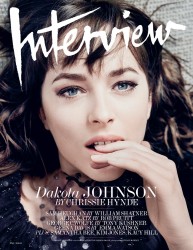

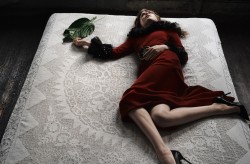


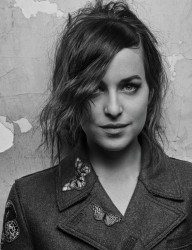
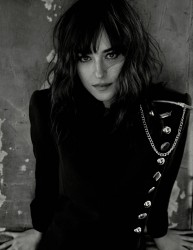
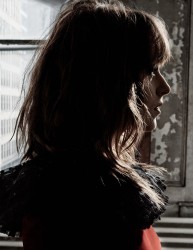
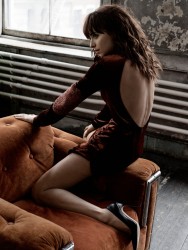
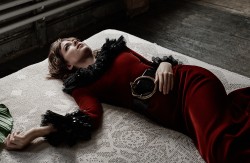


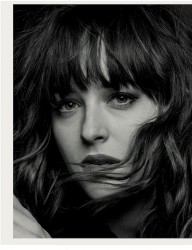
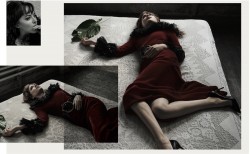
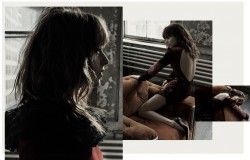
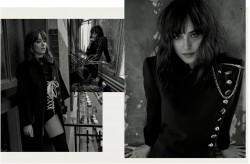
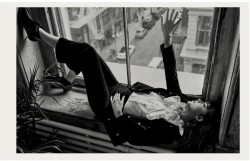

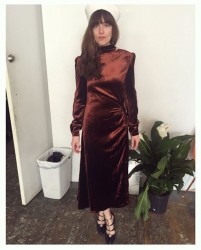
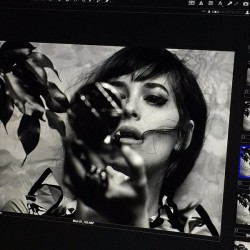
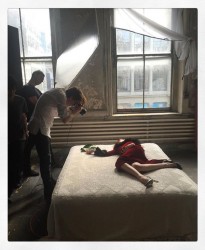
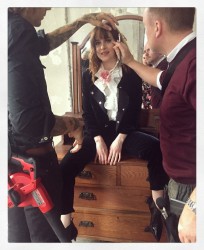
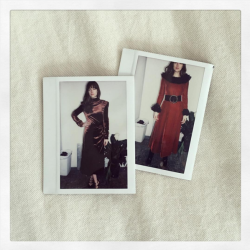
No comments:
Post a Comment